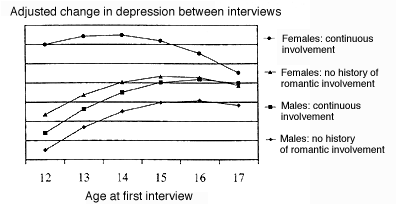Puppy love's dark side: First study of love-sick teens reveals higher risk of depression, alcohol use and delinquency
By Susan S. Lang

Teenagers in love have a higher risk for depression, alcohol problems and delinquency than teens who do not get romantically involved, finds a Cornell University sociologist. And love-sick girls, especially younger ones, are at an even higher risk for depression than boys.
The greater vulnerability of teen girls to romances might explain, to a great extent, why females begin exhibiting higher rates of depression in adolescence than males, says Kara Joyner, an assistant professor of policy analysis and management in the College of Human Ecology at Cornell. The analysis of almost 8,200 teens is the first nationally representative study to examine the impact of romantic relationships on adolescent depression. It was co-authored with J. Richard Udry of the University of North Carolina at Chapel Hill and is published in the Journal of Health and Social Behavior (December 2000).
"Depression often is used as an indicator of adolescent well-being, and depression in adolescence also has been linked to well-being in young adulthood, including depression, early marriage and marital dissatisfaction," says Joyner.
Using a sample of U.S. teens in grades seven through 12 in 134 public, private and parochial schools from the National Longitudinal Study of Adolescent Health, Joyner and Udry analyzed changes in the teens' romantic and psychological status between two interviews, about one year apart.
They found that adolescents who were romantically involved during the year experienced a significantly larger increase in symptoms of depression than adolescents who were not romantically involved. They also found that depression levels of romantically involved girls increased more sharply than that of romantically involved boys, especially among younger adolescents.
"Furthermore, the more interest that an adolescent expressed in romance, the larger their increase in depression, compared with their counterparts who showed no or little interest," Joyner adds. In analyzing why romantically inclined teen-agers are at risk for depression, the researchers find that some experience significant downturns in their relationships with their parents, some begin faltering at school and some experience unstable relationships. In addition, both adolescent boys and girls who "fall in love" experience more alcohol problems and delinquency than their counterparts with no history of romantic involvement.
Related World Wide Web sites: The following sites provide additional information on this news release. Some might not be part of the Cornell University community, and Cornell has no control over their content or availability.
o Kara Joyner:
http://www.human.cornell.edu/faculty/facultybio.cfm?netid=kj34&facs=1
o J. Richard Udry:
Media Contact
Get Cornell news delivered right to your inbox.
Subscribe